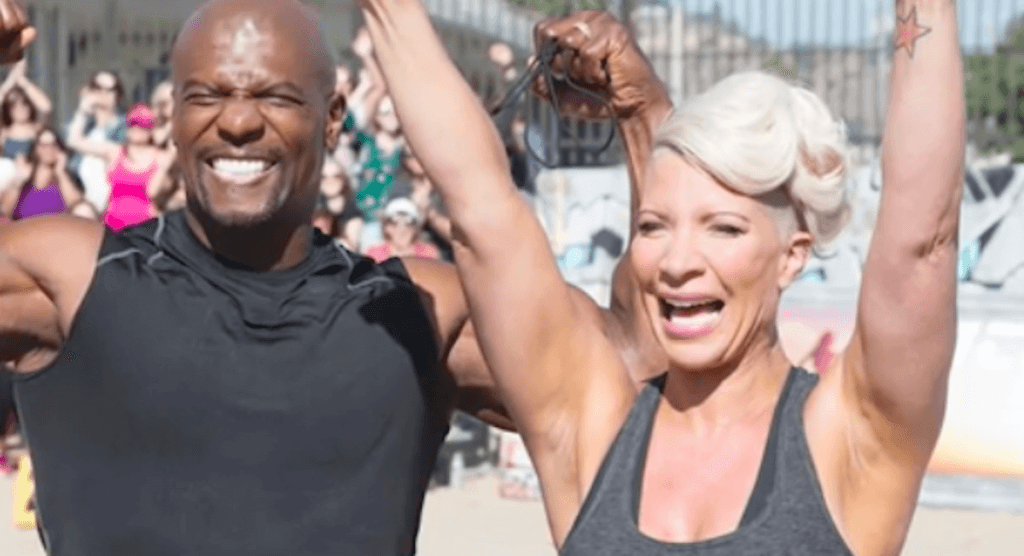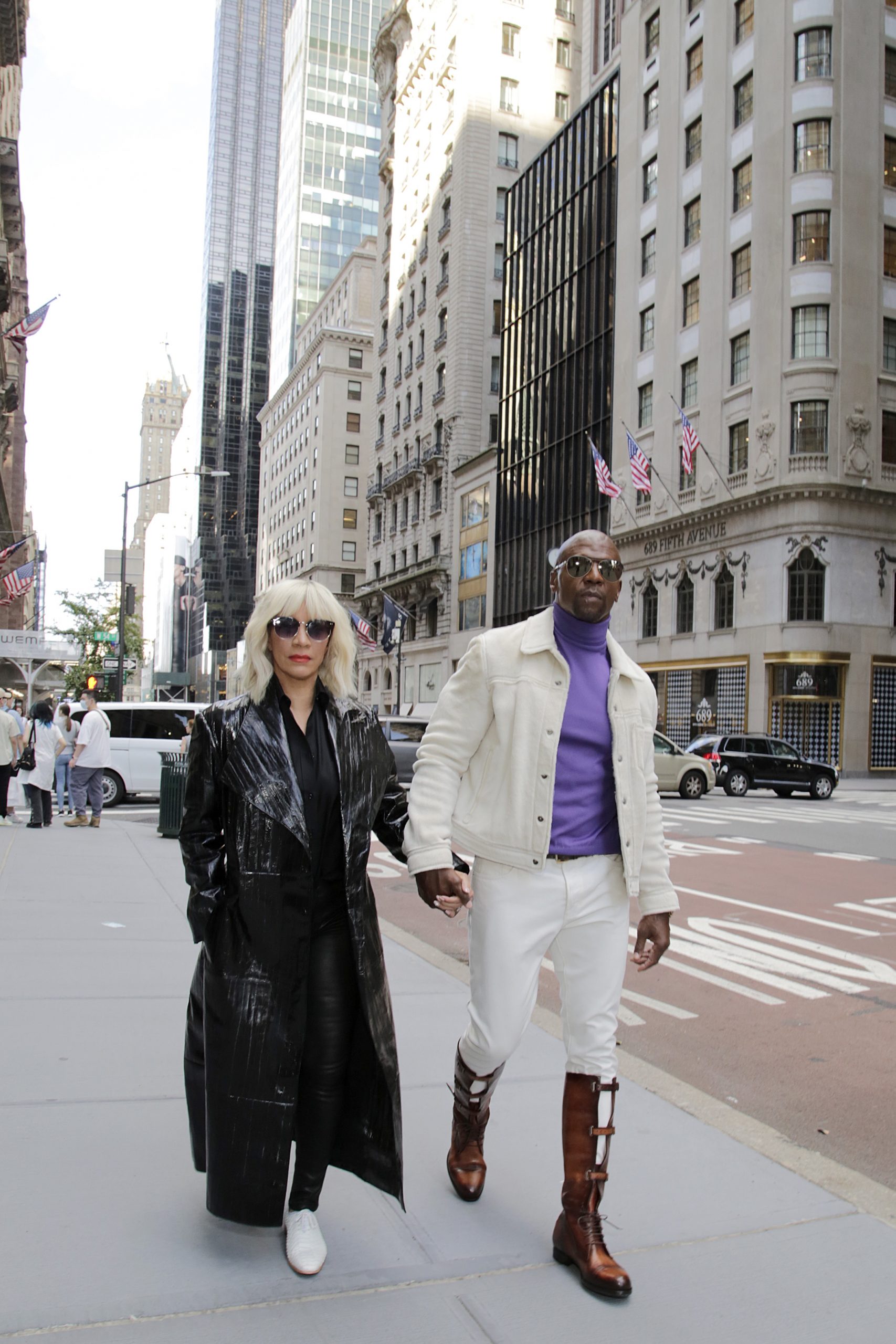A New Chapter: Love, Legacy, and Life After Cancer
- Actor Terry Crews and his wife, Rebecca, 59, are entering a new phase in their lives and relationship – empty nesters – now that their children are all living independently. Crews hopes Rebecca spends this stage in life doing everything she put on hold to raise her family, such as building her brand in faith-based projects and her clothing line.
- The Crews’ love and relationship have been tested during their 35 years of marriage, having to overcome a heartbreaking miscarriage and Rebecca’s breast cancer diagnosis, where Terry stepped up his caregiving and household support duties to make life easier for his wife as she focused on healing.
- Rebecca was diagnosed with stage 1 breast cancer. After treatment, she was declared “cancer-free” after undergoing a double mastectomy (removal of both breasts).
Terry, who met Rebecca in college, credits her with shaping the heart of their family.
Read More“She held all her dreams to raise our family. She’s a singer, she’s a performer, she’s a designer, and she said, ‘I can’t do this until I know all the kids are great.’ Now I am dedicated to her success.” Rebecca’s journey has been anything but easy. The couple weathered early heartbreak, including a miscarriage, and later faced one of their most difficult trials: Rebecca’s breast cancer diagnosis. Terry stepped into full support mode, taking on parenting duties and household responsibilities so Rebecca could focus on healing.

Their faith became a lifeline.
“Faith without hope is not faith…faith is the expectation of goodness and light coming to you from an eternal place of grace,” Rebecca wrote in a heartfelt Instagram post.
Now cancer-free, Rebecca is reclaiming the passions she once put on hold – continuing to build her brand both as a faith-based ambassador and a trendy clothing line.
View this post on Instagram
As seen in a recent Instagram post titled, “The Crews’ in London. Streets, Style and City Life,” Terry is right beside her, cheering her on—not just as a husband, but as a partner in purpose.
“There’s kind of like advantages to both things,” Terry said of their new phase. “Because now, though, my wife and I can pick up and go anywhere we want. It’s so freeing.”
From college sweethearts to cancer survivors, Terry and Rebecca Crews continue to model what love looks like when it’s built on sacrifice, faith, and the courage to begin again.
Rebecca Leaned On Her Faith, How It Can Influence Your Cancer Journey
RELATED: Early Stage Breast Cancer: What to Know About Testing
The Crews Cancer Journey
Rebecca’s breast cancer diagnosis three years ago brought her and her husband closer together because, around that time, they were overcoming some strife in their marriage.
Her cancer was in stage 1. She discovered it after undergoing a routine mammogram and ultrasound.
A mammogram is a breast cancer screening method that examines breast tissue for abnormalities.
Stage 1 breast cancers are relatively small; they either have not spread to the lymph nodes or only a small area of cancer has spread to the sentinel lymph node. Treatment will likely be surgery and radiation, followed by chemotherapy or some other therapy.
WATCH: How often do you get mammograms?
Rebecca admitted that after her diagnosis, she was “overwhelmed with fear,” and Terry was the first person she shared the emotional news with.
Crews underwent a double mastectomy procedure that involved removing both breasts to get rid of cancer. The procedure may also be performed as a preventative measure for women who are at a higher risk of developing breast cancer.
“A double mastectomy typically takes about two hours for the cancer part of the operation, the removal of the tissue,” Dr. Elisa Port, Chief of Breast Surgery at Mount Sinai Health System, told SurvivorNet.
WATCH: What happens during a double mastectomy?
“The real length, the total length of the surgery, can often depend on what type of reconstruction [a patient] has,” Dr. Port added.
During Rebecca Crews’ cancer journey, she gave large amounts of credit to her faith in God and her loving and supportive husband, Terry, for helping her through her cancer fight. Due to the COVID-19 pandemic, Terry took on the role of Rebecca’s caregiver while she recovered from surgery and the stress from treatment. He once joked the world shut down so he could take care of her, support her through tough days, and ultimately watch her get better.
“I actually felt a mild panic attack,” Terry told SurvivorNet. “The only way I can describe it is that I felt like my insides were melting,” he continued.
“I looked at it like an opportunity. This is what love is. When you look at the marriage vows, it’s not when everything’s great. This is where the rubber meets the road,” Terry said.

“My husband has watched me go through a lot, but the look on his face…he looked at me like I was going to die…He told me it felt like his insides were melting. I said, ‘I need you to be strong for me,’ and he said, ‘Okay,’ and hugged me, but I think he needed that hug,” Rebecca told People.
“My wife and I have been through a lot of things,” Terry told SurvivorNet in an interview. “We’ve lost homes; we’ve lost children before things that would have taken a lot of people out, and we survived them all,” he added.
“We made it. You get a new appreciation for what life is. We’ve been through everything but never faced a problem like this. It’s a whole new challenge, and I was proud of how she became a warrior. My wife is 100% cancer-free. This is a win,” Terry told SurvivorNet.
Understanding Biomarkers in Early-Stage Breast Cancer
Earlier this year, new guidelines on using biomarkers in early-stage breast cancer were published in the Journal of Clinical Oncology. The Breast Cancer Index (BCI) assesses the risk of breast cancer recurrence in some patients. The BCI is considered the “only genomic test to help guide extended endocrine therapy decisions in early-stage, HR+ (hormone receptor-positive) breast cancer patients with node-negative or node-positive recurrence.”
The recommendation is based on data from recent clinical trials, including MA-17, aTTom, and IDEAL, which prove the use of BCI for predicting the benefit of extended adjuvant endocrine therapy with tamoxifen or aromatase inhibitors (AI). Tamoxifen and AIs are drugs commonly used to stop estrogen from fueling the growth of hormone receptor-positive breast cancers.
Ultimately, the modified guidance helps reduce unnecessary extended endocrine therapy for early-stage breast cancer patients.
“While continuing anti-estrogen therapy beyond five years can help some women with HR+, early-stage breast cancer reduce their risk of recurrence, not all women benefit from a full ten years of treatment,” Michelle Garsha, president of diagnostic solutions at Hologic, tells SurvivorNet.
“Longer treatment is also associated with many potential side effects and toxicities that can negatively impact health and quality of life, such as osteoporosis, bone fractures, and joint pain,” she added. “Breast Cancer Index is the only test that can determine whether treatment beyond five years is likely to help a woman reduce her risk of the cancer returning.”
What To Ask Your Doctor
If you have been diagnosed with breast cancer, you may have questions about how to keep your strength through treatment. Here are a few questions to help you begin the conversation with your doctor:
- What treatment will I be receiving?
- What side effects are associated with this treatment?
- Are there steps I can take daily to help minimize these side effects?
- What physical activity routine do you recommend for me during treatment?
- Do you have recommendations for someone who doesn’t particularly enjoy exercise?
- Can you recommend a dietician who can help me with healthy eating tips and weight maintenance?
- I’ve been having trouble sleeping. Do you have any treatment recommendations?
Learn more about SurvivorNet's rigorous medical review process.

